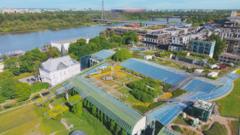**As communities mourn and grapple with the consequences, the political implications of the attack unfold.**
**Far-Right Exploitation of Magdeburg Attack Sparks Tension Amidst Grief**

**Far-Right Exploitation of Magdeburg Attack Sparks Tension Amidst Grief**
**The tragic Christmas market incident has ignited fierce debates over election issues, security, and rising far-right sentiments.**
The recent tragedy at a Christmas market in Magdeburg, where a car plowed through the festive crowd, has left the city shattered and grieving. Five individuals lost their lives, and more than two hundred were injured during the horrific event that unfolded just as the holiday season was underway. Eidwicht, a local who was at the market, expressed her lingering trauma: “I feel bad, I still do. My granddaughter was here. I rang her because my daughter told me that something had happened here. And she didn't answer for two hours."
The investigation has led to the arrest of a 50-year-old Saudi refugee, Taleb Al-Abdulmohsen, whose motivations remain unclear, but his social media activity showed an alliance with the far-right Alternative for Germany (AfD) party, which has stated such attacks result from immigration policies. While the AfD has refrained from commenting on the suspect's posts, they plan to hold mourning events in Magdeburg, led by party leader Alice Weidel.
In the wake of the attack, the AfD is seizing the opportunity to spotlight issues of security and immigration with upcoming federal elections on February 23, stirring fears that political opportunism may arise from this tragedy. Despite the suspect’s vocal criticism of Islam, AfD’s Martin Reichardt condemned the incident as a manifestation of political and religious extremism from outside Germany.
Weidel has taken an assertive stance, claiming that “Magdeburg would not have been possible without uncontrolled immigration”, while emphasizing the need for stringent security measures and deportations. Critics argue that the AfD is exploiting public fear and frustration following the attack. David Begrich from the anti-racism group Miteinander e.V. asserted the necessity for solidarity among communities, cautioning against scapegoating migrants.
The incident raises serious questions regarding Germany’s preparedness and security surrounding the Christmas markets, where enhanced measures were in place following prior threats. Locals are now left reeling from the shock, with some stallholders returning to collect their belongings while community tensions rise. Journalists covering the aftermath have reported hostility and aggression, particularly in light of a protest by far-right groups that drew attention on Saturday night.
As Magdeburg continues to process the tragedy, the undercurrents of fear, grief, and political maneuvering signal deeper societal rifts, raising concerns about the long-term impact on the local community and the nation at large.
The investigation has led to the arrest of a 50-year-old Saudi refugee, Taleb Al-Abdulmohsen, whose motivations remain unclear, but his social media activity showed an alliance with the far-right Alternative for Germany (AfD) party, which has stated such attacks result from immigration policies. While the AfD has refrained from commenting on the suspect's posts, they plan to hold mourning events in Magdeburg, led by party leader Alice Weidel.
In the wake of the attack, the AfD is seizing the opportunity to spotlight issues of security and immigration with upcoming federal elections on February 23, stirring fears that political opportunism may arise from this tragedy. Despite the suspect’s vocal criticism of Islam, AfD’s Martin Reichardt condemned the incident as a manifestation of political and religious extremism from outside Germany.
Weidel has taken an assertive stance, claiming that “Magdeburg would not have been possible without uncontrolled immigration”, while emphasizing the need for stringent security measures and deportations. Critics argue that the AfD is exploiting public fear and frustration following the attack. David Begrich from the anti-racism group Miteinander e.V. asserted the necessity for solidarity among communities, cautioning against scapegoating migrants.
The incident raises serious questions regarding Germany’s preparedness and security surrounding the Christmas markets, where enhanced measures were in place following prior threats. Locals are now left reeling from the shock, with some stallholders returning to collect their belongings while community tensions rise. Journalists covering the aftermath have reported hostility and aggression, particularly in light of a protest by far-right groups that drew attention on Saturday night.
As Magdeburg continues to process the tragedy, the undercurrents of fear, grief, and political maneuvering signal deeper societal rifts, raising concerns about the long-term impact on the local community and the nation at large.


















